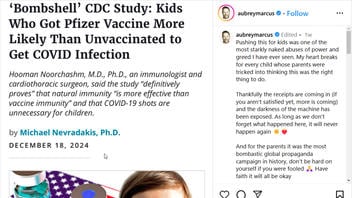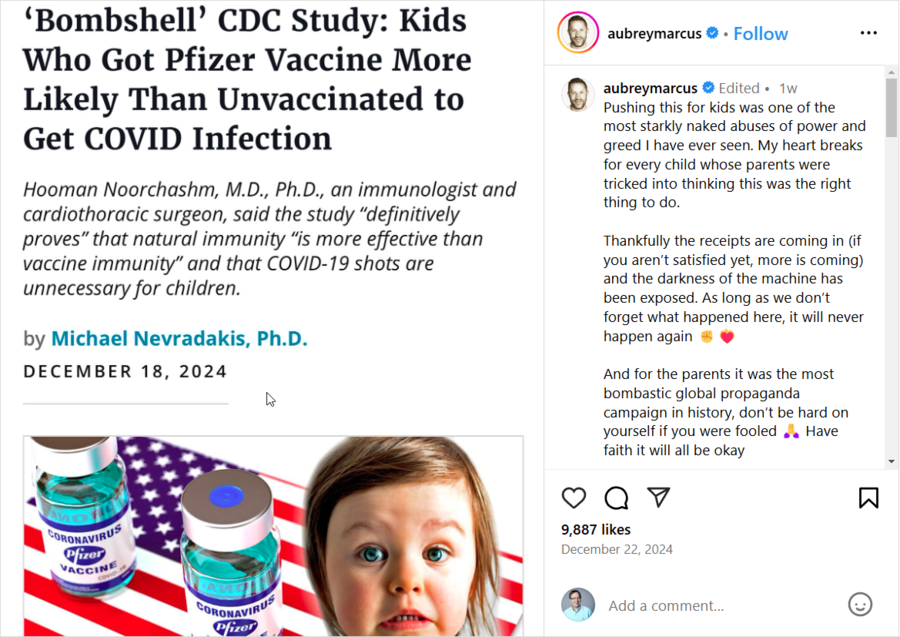STORY UPDATED: check for updates below.

Did a Centers for Disease Control and Prevention study find that children who received the Pfizer COVID-19 vaccine are more likely to get infected than those who are unvaccinated? No, that's not true: The study of children aged six months to four years found there was not a big difference in infection rates, especially for those who hadn't had COVID before, but that is not the same as a finding that vaccination increases infection risk. The study also noted that COVID vaccines are recommended to prevent serious illness.
The claim appeared in a post (archived here) published on Instagram on December 22, 2024, under the on-screen title "'Bombshell' CDC Study: Kids Who Got Pfizer Vaccine More Likely Than Unvaccinated to Get COVID Infection." The post's caption said:
Pushing this for kids was one of the most starkly naked abuses of power and greed I have ever seen. My heart breaks for every child whose parents were tricked into thinking this was the right thing to do.
Thankfully the receipts are coming in (if you aren't satisfied yet, more is coming) and the darkness of the machine has been exposed. As long as we don't forget what happened here, it will never happen again ✊❤️🔥
And for the parents it was the most bombastic global propaganda campaign in history, don't be hard on yourself if you were fooled 🙏 Have faith it will all be okay
This is what the post looked like on Instagram at the time of writing:
(Source: Instagram screenshot taken on Thu Jan 1 16:31:03 2024 UTC)
The post includes a screenshot of an article (archived here) from "The Defender," a publication of Children's Health Defense, an organization started by Robert F. Kennedy Jr. that's known for advocating that parents not have their children vaccinated.
The post doesn't provide any proof to back up its assertion that the study found kids who got the Pfizer COVID vaccine are more likely to catch COVID than unvaccinated kids.
The study
The study (archived here) cited in "The Defender" article, "Protection From COVID-19 Vaccination and Prior SARS-CoV-2 Infection Among Children Aged 6 Months - 4 Years, United States, September 2022 - April 2023," was published on December 5, 2024, and supported by the CDC.
The "Discussion" section of the study notes a small sampling of data that may support the claim in the headline of "The Defender" article, but the results are inconclusive. It said:
Interestingly, among participants without evidence of prior infection, those vaccinated with Pfizer-BioNTech were more likely to have SARS-CoV-2 infection and COVID-19 compared to those who were naïve [someone who has not had the disease] and unvaccinated. ... Further research is needed to assess vaccine effectiveness against infection for this age group for updated 2023-2024 vaccines. ...
The major limitation of this study was the lack of sample size which precluded us from estimating vaccine effectiveness and adjusting for all potential confounders, such as the proportion of circulating variants and 7-day incidence average by site, daycare attendance, and whether household members tested positive for SARS-CoV-2. Other limitations of this study, most notably, the potential for missed prior infection detections due to waning of anti-N SARS-CoV-2 antibodies ...
Considering all the statistics, the study authors reached these conclusions (emphasis ours):
Despite the limitations, data from this community cohort of young children with any SARS-CoV-2 infections and symptomatic COVID-19 disease contribute to understanding protection from vaccination and prior infection. COVID-19 vaccines are recommended to reduce severe illness; the overall risk of infection may not differ substantially between vaccinated and unvaccinated naïve children <5 years.
Bottom line: This study helps us understand how vaccines and past COVID infections protect young kids. COVID vaccines are recommended to prevent serious illness, but the chance of getting infected might not be very different for vaccinated and unvaccinated kids under 5 who haven't had COVID before.
Expert
Dr. James Lawler with the Division of Infectious Diseases at the University of Nebraska Medical Center told Lead Stories in a January 2, 2025, email that the study is a "great example of how bad mediocre science makes its way into the literature far more often than it should." He continued:
This paper certainly does not prove anything, definitively or undefinitively, regarding an increased risk for SARS=-CoV-2 infection after the Pfizer/BioNtech vaccine.
The problem with this study (and any study) is that the data you get out depends a lot on the design of the study. Garbage in - garbage out, as they say. This paper is saddled with detection and misclassification bias that skews the results considerably. If I had been a reviewer for this paper, I would have recommended rejection, or at least major overhaul and additional analysis.
As Lawler explained to Lead Stories, the main problem with the study is that it likely missed a lot of COVID cases in unvaccinated kids. Here's why: Parents who don't vaccinate their kids are also less likely to test them for COVID. This means many unvaccinated kids who actually had COVID might not have been counted.
The study's own data shows this -- unvaccinated kids were less likely to report a past COVID infection and didn't stick to regular testing as much as vaccinated kids. Because of this, more unvaccinated kids were wrongly labeled as 'never had COVID,' making the vaccine look less effective than it really is.
This kind of mistake could even make it seem like the vaccine increases the chance of getting COVID when it doesn't.
Pfizer
In a January 2, 2025, email to Lead Stories, Pfizer Media Relations responded to the claim in the Instagram post. A Pfizer spokesperson said:
Our data pre- and post-licensure have been, and are, extensively reviewed by multiple regulatory and advisory bodies around the world. Pfizer and BioNTech's COVID-19 vaccines have been administered to billions of adults, adolescents and children, generating robust data demonstrating a favorable safety profile and high level of protection against severe COVID-19 disease and hospitalization.
The Pfizer spokesperson continued:
We continue to believe that broad vaccination programs are an essential tool for preventing COVID-19, especially COVID-19-associated hospitalizations and severe disease. Authorization of this season's vaccine gives families the option to further protect their young children against circulating sublineages [variants].
The CDC recommends (archived here) that everyone six months and older get an updated COVID-19 vaccine.
In the conclusion to his email to Lead Stories, Lawler said vaccination is a safer and better choice for protecting children:
Finally, I continue to be baffled by the upside-down logic promoted by some healthcare professionals who would promote 'natural immunity' (better named 'survivor immunity') for COVID over vaccine. Catching a disease to prevent a disease makes no sense.
We know that COVID is not always a benign disease in kids. Since the beginning of the pandemic, the US has experienced close to 2,000 pediatric deaths and over 180,000 pediatric hospitalizations from COVID. Millions of kids have experienced long COVID, many of whom are still struggling. The risk of COVID does not go away after your first infection, and subsequent infections carry significant risk.
Overwhelming evidence supports the safety of COVID vaccines in kids and the fact that the vaccines prevent COVID in kids, reduce transmission in households, reduce risk of severe infection, and reduce the risk of long COVID. This is true regardless of whether you had a prior infection or not.
Kids are much better off being vaccinated to reduce all these risks.
Read more
Additional Lead Stories fact checks of claims about vaccines can be found here.
Other Lead Stories fact checks of claims involving Robert F. Kennedy Jr. can be found here.
Updates:
-
2025-01-03T15:17:58Z 2025-01-03T15:17:58Z Adds context from Dr. James Lawler at the University of Nebraska Medical Center.


















